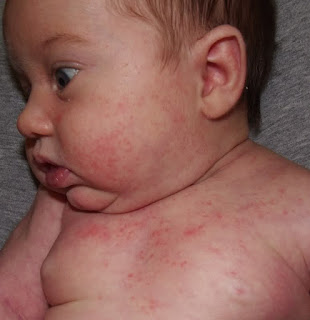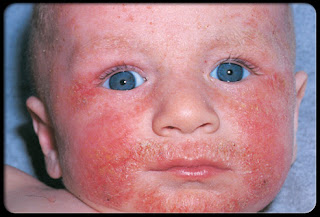Baby heat rash, also known as prickly heat, more itching than skin rash caused by blockage of sweat glands due to excessive sweating. This thing may be repeated from time to time, especially when the air is hot and humid, but it does not have the effect of long-term illness. Children and babies who are frequently affected by prickly heat, but adults can also be affected either because of exercise or exposure to heat.
Scientific term used to refer to a heat rash Baby is 'miliary'. Small red blisters happened to the neck, shoulders, back and other areas where sweat clogged. Clogged pores can also be caused by dead skin cells and bacteria known as Staphylococcus epidermidis. Treatment is necessary because it can cause itching, burning / stinging and other discomfort, disturbing. If not treated, the infection hence grow on skin. There are several ways that can effectively treat and cure all symptoms.
Baby Heat Rash Symptoms
Small red bumps arise in the entire Baby skin when affected by heat rash. The wounds of the rash usually appears around the neck, the folds of the arms and legs and armpits where sweat is mostly, although it also may be able to spread keseluru body.
Baby Heat Rash Cause
As its name, heat rash usually caused by high humidity. The hot air causes pressure on the sweat glands are underdeveloped because they can not regulate body heat efficiently. Excessive wearing the Baby may suffer from heat rash.
As its name, heat rash usually caused by high humidity. The hot air causes pressure on the sweat glands are underdeveloped because they can not regulate body heat efficiently. Excessive wearing the Baby may suffer from heat rash.
Heat rash Baby Care
Is not required to provide treatment for heat rash. the way is keep the Baby cool and comfortable by removing excessive clothing and minimize body heat.
Is not required to provide treatment for heat rash. the way is keep the Baby cool and comfortable by removing excessive clothing and minimize body heat.
Prevention and treatment for Baby Heat Rash
As mentioned earlier, Baby and children are most susceptible to heat rash because their sweat glands are underdeveloped. Parents usually put excessive clothing to keep them warm and protect her Baby from insects such as mosquitoes, thus making Baby affected by excessive sweating and heat rash. In infants, it can also happened due to a very tight clothes and diaper. Follow the tips below to resolve this condition on your baby.
As mentioned earlier, Baby and children are most susceptible to heat rash because their sweat glands are underdeveloped. Parents usually put excessive clothing to keep them warm and protect her Baby from insects such as mosquitoes, thus making Baby affected by excessive sweating and heat rash. In infants, it can also happened due to a very tight clothes and diaper. Follow the tips below to resolve this condition on your baby.
- Bath twice a day helps keep the Baby stay cool but be careful not to use water that is too hot due to high temperatures can cause a rash.
- Use bath products wisely and use a soft, fragrant and hypoallergenic. You can also use a lotion made from wheat bath to help relieve itching. As an alternative, add salt to the water and stir well before bringing Baby to shower. Salt has anti-bacterial effect but be careful not rubbed it to baby skin.
- When drying Baby, fairly patted with a towel because scratching can cause friction that will improve skin problems. Note over the folds of the skin.
Daily moisturizer helps your baby's skin remains moist, because it is easy to drought. - Pick a good moisturizer containing petroleum jelly to better results and to better absorption use immediately after bathing while skin is still damp.
- Do not use powder or talc powder to ease itching in infants because Baby can inhale.
- Massage after a bath or before going to sleep good to calm your baby and Improving your blood circulation. Apply baby oil and gently caress can help calm Baby and sleep better.
- Wear comfortable clothing Baby. But not oversized loose clothing - cotton is best to reduce skin irritation caused by friction. Do not swaddle your newborn baby.
- New clothes should be washed before use. Get rid of the clothing label that may irritate the skin. Check the trimmings and the seam that may cause skin irritation.
- Scratching the rash can improve existing ones. To prevent the baby from scratching, nail clippers and trim baby's nails regularly and wear gloves. If gloves are too small, use socks that are comfortable and fit in the hand so that Baby can not pull it.
- When put Baby on the bed, put the baby was worth to keep it cool and comfortable. Fleece blankets and quilts can be a nice gift but sometimes not suitable for a country with a tropical climate with high humidity levels.
- Your baby remain in a cold environment with air circulation and sufficient gusts. If you must take your baby out during the day, wear a hat and apply sunscreen on the face, hands and feet.
- Provide a cool environment that is not damp by using AC or fan.
- Keep Baby from diapers and clothes for a while or make it wear loose clothing. Avoid synthetic clothing and only use cotton clothing.
- Use prickly heat powder and lotion where there are prickly heat.
- Avoid oil-based ointments, because they make the skin warm and moist which will only worsen the condition. Also, avoid massaging baby oil, if he is suffering from prickly heat.
- Use a wet flannel to relieve prickly heat affected area and bathing the baby in warm water.
- You can also apply aloe vera gel on the affected area of prickly heat.
- Trim baby's nails regularly and wrap his hands with socks so that the baby does not scratch the area.
Heat rash may moderate disease but infection can be increased if excessive scratched. Immediately to the doctor if the skin is damaged due to continuous scratch can lead to bacterial infection. This can grow into a festering lumps, swelling or thickening of the skin. Note also signs of an increase in emotion, crying, listlessness, loss of appetite or fever.



